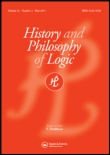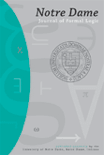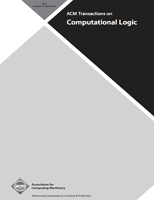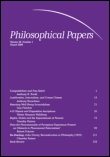
HISTORY AND PHILOSOPHY OF LOGIC
metrics 2024
Illuminating the Historical Landscape of Logic
Introduction
HISTORY AND PHILOSOPHY OF LOGIC is a prestigious journal published by Taylor & Francis Ltd, focusing on the intricate relationships between historical contexts and philosophical inquiries within the realm of logic. With its ISSN 0144-5340 and E-ISSN 1464-5149, the journal has established itself as a vital academic resource since its inception in 1980 and will continue to contribute to the field until 2024. It holds an impressive status, ranking in the Q1 category in History and Q2 in History and Philosophy of Science according to the 2023 category quartiles. This journal is recognized for its high-impact research, achieving notable positions in Scopus ranks, including 80th percentile in Arts and Humanities - History and 58th percentile in History and Philosophy of Science. Although it does not offer open access, it remains a crucial platform for scholars, researchers, and students aiming to explore and advance knowledge at the intersection of logic's history and its philosophical implications.
Metrics 2024
 0.30
0.30 0.50
0.50 0.50
0.50 21
21Metrics History
Rank 2024
Scopus
IF (Web Of Science)
JCI (Web Of Science)
Quartile History
Similar Journals

Revista de Filosofia-Madrid
Innovating Conversations in PhilosophyRevista de Filosofia-Madrid is a prestigious open access journal dedicated to the field of philosophy, published by the Universidad Complutense de Madrid since 1987. With a commitment to fostering critical discourse and intellectual exploration, this journal serves as a platform for philosophers, researchers, and students alike, offering a range of articles that reflect contemporary philosophical debates and historical perspectives. The journal is indexed in Scopus, ranking in the 41st percentile within its category, and emphasized as a Q3 ranked publication for 2023. The journal’s open access model ensures that its content is freely available to a global audience, promoting widespread dissemination of philosophical knowledge and ideas. As part of its mission, Revista de Filosofia-Madrid seeks to bridge diverse philosophical traditions while encouraging innovative approaches to age-old questions, making it an invaluable resource for anyone engaged in philosophical inquiry.

Anales del Seminario de Historia de la Filosofia
Fostering Global Conversations in Historical PhilosophyAnales del Seminario de Historia de la Filosofia, published by UNIV COMPLUTENSE MADRID, SERVICIO PUBLICACIONES, is a distinguished open-access journal that has been contributing to the fields of History and Philosophy since 1980. With an ISSN of 0211-2337 and E-ISSN 1988-2564, it aims to provide a scholarly platform for the dissemination of original research and critical reviews pertinent to the historiography of philosophy and its influences on modern thought. The journal features a robust open-access model, ensuring that all published content is readily available to researchers, students, and professionals worldwide. The journal currently enjoys recognition within its field, classified within the Q3 quartile in History and Philosophy of Science and Q2 quartile in Philosophy as of 2023. Positioned within the heart of Spain, the journal facilitates international academic dialogue and invites submissions that explore the intersection of past philosophical contexts and contemporary issues. Whether you are a seasoned scholar or a budding philosopher, Anales del Seminario de Historia de la Filosofia aims to foster a deeper understanding of philosophical traditions and their ongoing relevance in today’s discourse.

Journal of Logic Language and Information
Bridging Disciplines: Where Logic Meets LanguageThe Journal of Logic Language and Information, published by SPRINGER, stands as a leading interdisciplinary platform dedicated to the exploration of the interconnections between logic, language, and information theory. With a history spanning from 1992 to 2024, this esteemed journal provides a vital forum for researchers, professionals, and students in fields such as Computer Science, Linguistics, and Philosophy. Notably recognized in the 2023 rankings, it holds a Q2 quartile in Computer Science (miscellaneous) and Q1 quartiles in both Linguistics and Language, and Philosophy, reflecting its high academic quality and relevance. Despite its nuanced focus, the journal's diverse scope attracts a global readership, encouraging innovative research and critical discourse. Although it is not an Open Access publication, the Journal's valuable contributions can be accessed through various institutional subscriptions, ensuring that its scholarly output remains influential within the academic community.

Dao-A Journal of Comparative Philosophy
Navigating the Landscape of Diverse Philosophical IdeasDao: A Journal of Comparative Philosophy, published by Springer, stands as a preeminent platform in the field of comparative philosophy. Since its inception in 2003, this journal has cultivated an esteemed reputation, evidenced by its Q1 ranking in Philosophy and a commendable position within the top 67th percentile of arts and humanities disciplines according to Scopus metrics. The journal invites scholars to engage in a rich dialogue that reflects the diversity of philosophical thought across cultures, promoting interdisciplinary research and fostering an international academic community. Although it does not offer open access, its rigorous peer-review process ensures that each publication contributes significantly to the advancement of philosophical inquiry. Based in the Netherlands, Dao's commitment to exploring the intersections of Eastern and Western philosophical traditions remains vital during its ongoing coverage from 2007 to 2024. By publishing original research, review articles, and critical essays, Dao plays an essential role in shaping the discourse within the philosophical landscape, serving as a valuable resource for researchers, professionals, and students alike.

Notre Dame Journal of Formal Logic
Elevating Scholarly Discourse in Formal LogicNotre Dame Journal of Formal Logic is a premier academic publication dedicated to the advancement of research in the field of logical studies. Published by DUKE UNIVERSITY PRESS, this journal has been a significant contributor to the discipline since its inception in 1960, with an impressive convergence of scholarly articles expected to continue through 2024. With its focus on rigorous formal logic, the journal plays a crucial role in fostering discussions that bridge mathematics and philosophical inquiry, holding a notable Q2 ranking in the 2023 Logic category. Despite its non-open-access status, the journal reaches a wide audience of researchers, professionals, and students committed to exploring the foundational aspects of logics. Located in Durham, NC, it provides a platform for innovative thought and critical engagement within the logic community. With its impactful contributions, the Notre Dame Journal of Formal Logic stands as a vital resource for those seeking to deepen their understanding of both classic and contemporary logical theories.

ACM Transactions on Computational Logic
Driving Excellence in Theoretical and Practical LogicACM Transactions on Computational Logic, published by the Association for Computing Machinery, is a premier journal dedicated to the advancement of computational logic, spanning the disciplines of computer science and mathematics. With its ISSN 1529-3785 and E-ISSN 1557-945X, this journal has established itself as a vital resource within the academic community, particularly noted for its influential contributions reflected in its 2023 scopus rankings. The journal holds notable quartile rankings, achieving Q1 in the fields of Computer Science (miscellaneous) and Logic, alongside Q2 in Computational Mathematics and Theoretical Computer Science, indicating its prestigious position in the respective categories. Researchers, practitioners, and students can access a wealth of rigorous research articles that delve into both theoretical frameworks and practical applications of computational logic, fostering innovation and collaboration in the field. As it converges towards its 2024 objectives, ACM Transactions on Computational Logic continues to uphold a commitment to excellence and impact, striving to shape the future of computational theories and methodologies.

Logic and Logical Philosophy
Fostering Dialogue in Logical PhilosophyLogic and Logical Philosophy is a distinguished journal published by Nicolaus Copernicus University Torun, Poland. With its ISSN 1425-3305 and E-ISSN 2300-9802, the journal has established itself as a premier outlet for cutting-edge research in the field of philosophy, specifically focusing on the intricate intersections of logic and philosophical inquiry. Since its inception, the journal has consistently demonstrated its impact within the academic community, achieving a commendable Q1 ranking in the 2023 Arts and Humanities category, placing it in the 73rd percentile of publications in the field. The journal aims to foster scholarly dialogue and contribute significantly to the advancement of philosophical understanding through rigorous research articles, critical reviews, and discussions. With a commitment to high academic standards and accessibility—though specific access options may vary—Logic and Logical Philosophy remains an essential resource for researchers, professionals, and students alike, paving the way for innovative philosophical discourse until 2024 and beyond.

Filosofskii Zhurnal
Illuminating Connections Between Philosophy and LanguageFilosofskii Zhurnal, published by the esteemed Russian Academy of Sciences - Institute of Philosophy, is a renowned academic journal focused on the vibrant fields of Philosophy, Cultural Studies, History and Philosophy of Science, and Linguistics. With an ISSN of 2072-0726 and an E-ISSN of 2658-4883, this esteemed publication has been a pivotal source of scholarly discourse since its inception in 2019, with converged years extending through 2024. Holding a distinguished Q2 quartile ranking in several disciplines, the journal is instrumental in advancing knowledge and research within its realms, making significant contributions to the understanding of philosophical thought, cultural dynamics, and language interpretation. Although it does not currently offer open access options, the journal maintains a strong presence in Scopus with notable rankings, including its position at #490/806 in Philosophy and #837/1304 in Cultural Studies. By providing a platform for original research, critical reviews, and interdisciplinary dialogue, Filosofskii Zhurnal serves as a valuable resource for researchers, professionals, and students seeking to deepen their understanding of philosophical inquiry and related fields.

JOURNAL OF PHILOSOPHICAL LOGIC
Illuminating the Pathways of Logical InquiryThe JOURNAL OF PHILOSOPHICAL LOGIC, published by Springer, is a prestigious scholarly journal specializing in the intricate intersections of logic, philosophy, and their diverse applications. Since its inception in 1972, this eminent journal has become a cornerstone of philosophical discourse, attracting leading researchers and scholars in the field. With an impressive ranking of #77 out of 806 in the Scopus Arts and Humanities - Philosophy category and being positioned in the top 10th percentile, it stands as a Q1 journal, denoting its significant impact and rigorous standards in academic publishing. Although not an Open Access journal, it offers access to a wealth of high-quality articles contributing to the advancement of logical theory and practice until 2024. The journal aims to foster a vibrant platform for the exploration and development of philosophical logic, encouraging groundbreaking research and innovative dialogue among professionals and students alike, and solidifying its role as an essential resource within the philosophical community.

Philosophical Papers
Illuminating the Complexities of ExistencePhilosophical Papers, an esteemed journal published by Routledge Journals, Taylor & Francis Ltd, stands as a pivotal resource in the field of philosophy. Having established its presence since 1972, this journal has converged a wealth of intellectual discourse and contributes to the continuous development of philosophical thought until 2024. With a prestigious Q1 category ranking in the arts and humanities, and a notable 86th percentile ranking in Scopus's philosophy category, it underscores its commitment to rigorous scholarship and influential research. Although Open Access options are not currently available, the journal remains a vital platform for philosophers, researchers, and students aiming to engage with pivotal philosophical debates and advancements. Set in the UK, Philosophical Papers exemplifies the intersection of tradition and innovation in philosophical inquiry, making it an indispensable reference for anyone dedicated to exploring the complexities of human thought and existence.